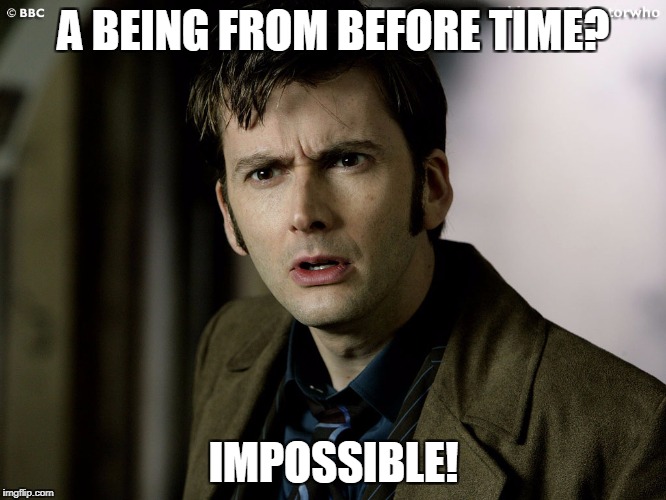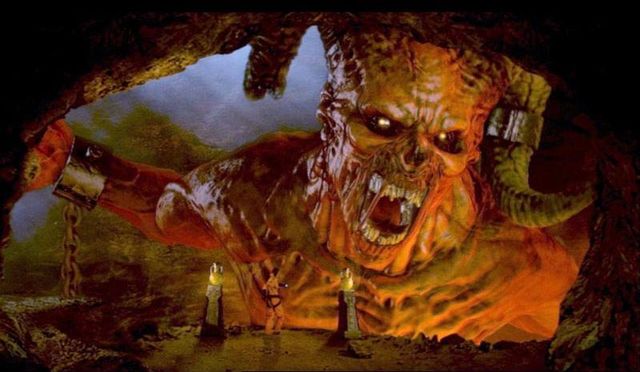The Doctor Doesn’t Believe in the Devil—Should We?
Some stories are special.
The ones that grab our attention and capture our imagination in startling ways and on deeper levels that sink into our core.
They leave us breathless, hearts pounding.
And sometimes, their underlying ideologies are more atrocious than dragon breath. Such as a two-parter in David Tennant’s first season as the Doctor.
What are we supposed to do when confronted by such discrepancies?
As Christians, how can—and should—we filter the dogmas used in secular entertainment?
Note: contains spoilers for episodes 8 and 9 of Season 2.
When the Doctor Meets the Devil
In “The Impossible Planet,” the Doctor and Rose find themselves stranded on, well…the title says it all. A planet that shouldn’t really exist. Where a small Torchwood team is conducting a mining operation. Over the course of the episode, they discover the planet harbors a dark secret more terrifying than they could imagine.

Image via tardis.wikia.com
That leads to “The Satan Pit,” where the pieces begin to fall into place. Turns out, the planet is also doubling as Satan’s prison. Cue many complications for the crew, the Doctor, and Rose as well as a launch into the explorations of religion as they’re forced to face the reality of the Devil’s existence.
Now, this is BBC we’re talking about. Not exactly known for being a bastion of truth. As such, it comes as no surprise that the underlying philosophy was as strong as a punctured piece of tinfoil.
And the main culprit? Guess who…
To Believe or Not to Believe
As the characters are confronted with more evidence and more encounters that become unmistakable, they find their beliefs shaken. The Doctor remains unconvinced, which leads to this exchange with one of the crewmembers:
The Doctor: You get representations of the horned Beast right across the universe in myths and legends of a million worlds. Earth, Draconia, Vel Consadine, Daemos… The Kaled god of war, the same image, over and over again. Maybe, that idea came from somewhere. Bleeding through, a thought of every sentient mind…
Ida Scott: Originating from here?
The Doctor: Could be.
Ida Scott: But if this is the original, does that make it real? Does that make it the actual Devil?
The Doctor: Well, if that’s what you want to believe. Maybe that’s what the Devil is, in the end. An idea.
He also gives a reason for his distrust:
If that thing had said it was from *beyond* the universe, I’d have believed it. But before? Impossible.

Amusing side note…this image’s size is 666 x 500. #coincidence?
Ironically, his reasoning is as airtight as a spacesuit with a leak. Why? Because at the beginning of episode 9, when he and Rose discover the planet is orbiting a black hole, he says, “But that’s impossible.” Yet he’s staring at proof that he’s wrong.
Given that recent undermining of his belief, his doubt of the Beast’s claim loses potency.
Eventually, after coming face-to-face with the Beast, the Doctor concedes its physical existence. But in his worldview, he can’t admit to confronting the actual Devil, something more than an idea.

The Doctor confronts the Devil.
Image via tardis.wikia.com
What, then, does the Doctor believe in? He tells us in this passionate, stirring, hopelessly askew declaration (referring to Rose at the end):
Well, I’ve seen a lot of this universe. I’ve seen fake gods and bad gods and demi-gods and would-be gods. I’ve had the whole pantheon. But if I believe in one thing… just one thing… I believe in her!
Sounds great but really, Doctor? Is that the best you can do?
Which begs the question, how do we reconcile such a fantastic story with such a flawed message?
Separating Story from Worldview
The storytelling in the episodes is superb. Relentless pacing, unique setting, high stakes, impossible situations, mysteries, betrayal, sacrifice, plot twists. Everything you could want from a story.
Except for a strong theme.
What makes this example fascinating is the juxtaposition of storytelling prowess and Truth-based ineptitude.
It’s both inspiring and depressing.
As Christians, what’s the best way to react when faced with a situation like this?
I don’t think you can apply a cookie-cutter approach, where one way is exactly right and everything else falls outside the lines. And I know some people may object to watching or reading stories that stray so far from the true north of Truth. Nothing wrong with that. But for those who enjoy secular entertainment, how do we approach the question?
At the core, it boils down to expectations. We don’t expect Doctor Who to present us with a Christian view of the world. Neither do we expect to derive the foundational pillars of what we believe and why we believe it from the show either. Or any other mainstream entertainment.
We’ll take that from the Bible, thank you.
Can we learn from these stories? Absolutely.
Should we come to them with care? Always.

This frees us to appreciate secular stories for the benefits they do have. However, that leaves the responsibility in our court (or TARDIS). Rather than being passive bystanders, we should constantly filter what we watch and read through the lens of our worldview. One informed by the Truth and able to discern the falsehoods, no matter how brazen or subtle.
When we do that, we can enjoy well-made stories, though they may stray far from the truth. Because even if the Doctor sees the Devil as nothing more than an idea, he’s not always right.
What are some ways Christians should approach stories that blatantly fly in the face of Truth? How have you personally handled such issues?










































My first thought when encountering this issue is, why am I constantly encountering this issue? Why does it so often feel as though the only choices are anti-Christian entertainment or no entertainment at all?
That question could be its own blog series, but I’d like to focus on one aspect of this question that I don’t usually see covered: how community affects choice. We’re all aware of how interesting and dynamic fan communities can be, and how they can make or break the experience, or even be an experience unto themselves, largely independent from the original work itself. But, I think it goes even further than that, into defining, even for people who do not participate in these communities, what constitutes acceptable choices in entertainment.
The best modern example is Game of Thrones. I made a personal decision not to participate in Game of Thrones, and over the years I was constantly reminded of the various conversations and cultures I was excluded from. It became quite apparent that a fan of Game of Thrones could expect to take part in a community and conversation with depth, breadth, and prestige far beyond what a fan of any other fantasy work could expect. While it didn’t ultimately persuade me to abandon my standards, it did make me reconsider, because I could see that it offered real benefits beyond the merits of the work itself. Dr. Who also participates in this–a strong story further elevated by its far-reaching and passionate community.
The flip side of this is, telling someone that if they don’t like it, they can just watch something else is something of a hollow comfort. It is true that we are living in a golden age of entertainment, with everyone from the big Hollywood players all the way down to the indies being more prolific than ever. But, even with all those out there, only a few things ever reach the level of generally accessible conversation. Sure, any GoT conscientious objectors can go read The Breaking of Jandaria or any of the other thousands of less objectionable fantasy titles out there, but they’ll be doing it by themselves, in a vacuum. It’s just not the same when nobody knows what you’re talking about!
Heck, bring on that blog series! It’s a topic worth discussing, how much a community (or lack thereof) contributes to enjoying a thing. It’s more or less the point of this site, to build a community, yeah?
But I think most Christians who like not-typically-Christian things will fill the vacuum by participating in a secular community, whether something taboo like GoT or something like My Little Pony. People go where the community is at.
For example, I don’t talk about my yarn hobby here, but I have a Pinterest and a Ravelry account (I don’t have anyone convenient IRL to blather about yarn with, so I do it online). Through those I can find a porpskillion mommyblogs about knitting and crochet and Tunisian crochet. Or find half a dozen charts with the legends in Russian or Japanese that are still intelligible because we all understand the symbols.
(BTW I will totally blather on about my yarn if you ask.)